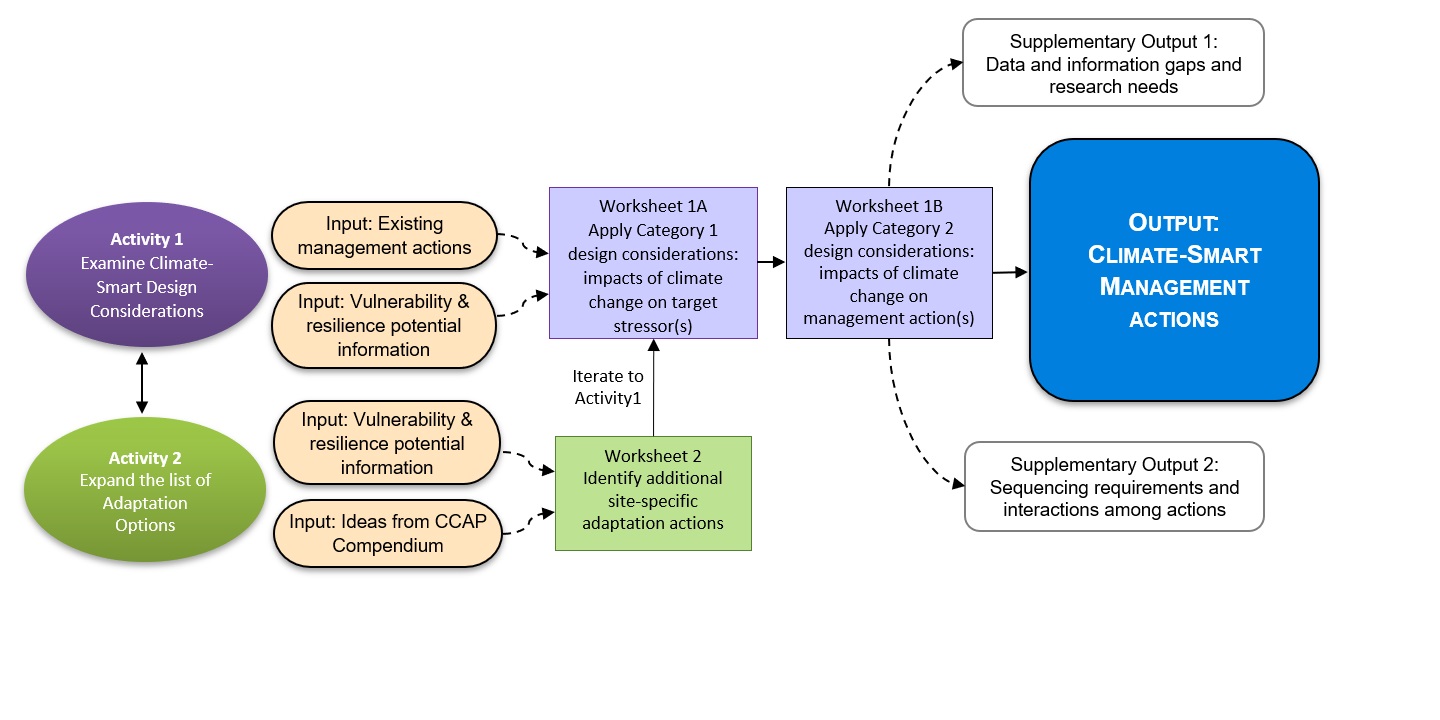Adaptation Design Tool
The Adaptation Design Tool helps coral reef managers incorporate climate-smart design into their plans by considering the effects of climate change on ecosystem stressors and implications for effective management. The Design Tool is a product of the Corals & Climate Adaptation Planning project, a joint collaboration under the Climate Change Working Group of the U.S. Coral Reef Task Force. While the Tool can be used by individuals, it is better suited to small groups that include a range of expertise in coral reef ecology, climate change, and management approaches. Learn more through this self-paced online course.
The Adaptation Design Tool is based on exploration of “Climate-Smart Design Considerations”, ref which are a series of questions related to how climate change is likely to impact (1) the stressors being managed by an action and (2) the effectiveness of the action in dealing with those stressors. Based on the answers to these questions, managers can consider how the design or implementation of their management actions could be modified for greatest effectiveness in the face of climate change. This may be followed by a review of additional adaptation options for potential inclusion in the plan, based on recommendations from the literature.
Figure 1 illustrates the activities that comprise the Adaptation Design Tool:
Activity 1: Develop Climate-Smart Design Considerations for existing conservation/management actions, and adapt existing actions to account for climate change.
Activity 2: Identify the full range of additional adaptation options to more comprehensively address climate change impacts, tailor them to local conditions, and add them as a second round of Activity 1.
Together these activities help to make an existing plan climate-smart and potentially expand the management/adaptation actions. They also can help in identifying actions that may not be effective in the face of climate change (and thus may need to be replaced). Worksheets are included in the Tool to step through each activity, with guidance on how to develop design considerations using information from vulnerability assessments and the Compendium. ref The primary output is a list of possible climate-smart actions that can be considered when creating or updating a management plan. Supplementary outputs include data and information gaps and research needs, and key interactions among management actions and timing issues relevant to implementation.
Advantages of the Adaptation Design Tool
- Provides a logical framework for identifying climate-smart actions by breaking the process down into a series of small easy-to-follow steps
- Results in a comprehensive list of adaptation actions to consider for inclusion in a management plan
- Can be used to refine management actions in an existing plan, or to identify actions for a new plan
- The tool is designed to be used iteratively, to accommodate new datasets as they become available
- Facilitates expert synthesis of multi-disciplinary information through structured group discussion
- Helps identify data gaps and research needs
- Reveals potential interactions among management actions (synergies, sequencing issues) that are relevant for evaluating actions for implementation
Limitations of the Adaptation Design Tool
- For best results, requires a time investment (e.g., 2-3 days) to select and bring together experts
- Inclusion of experts that span multiple disciplines (coral reef science, climate science, management planning, etc.) is essential
- Requires advance collection and summarization of climate change vulnerability assessment information as a key “input” for using the tool
- Does not include the next step of how to narrow the range of potential actions through evaluation and selection of logical groupings for implementation
- Some adaptation actions may require technical information or design skills that are currently unavailable, such that additional research and capacity-building is necessary
The project is engaged in a series of expert consultations with coral reef managers in the Pacific (West Maui, Hawai’i) and Caribbean (Guánica, Puerto Rico) to refine the Adaptation Design Tool. Based on these efforts, improvements will be made to the worksheets and to the associated guidance document in preparation for final publication. Additionally, there are plans to apply the Tool to inform a management plan revision process at a site in the Caribbean.
For more information on the project, contact Jordan West (west.jordan@epa.gov).
Resources
Adaptation Design Tool Online Course
Adaptation Design Tool: Corals & Climate Adaptation Planning
Climate-Smart Design for Ecosystem Management: A Test Application for Coral Reefs
Climate-Smart Conservation: Putting Adaptation Principles into Practice
Corals & Climate Adaptation Planning Project Presentation
Scanning the Conservation Horizon: A Guide to Climate Change Vulnerability Assessment

